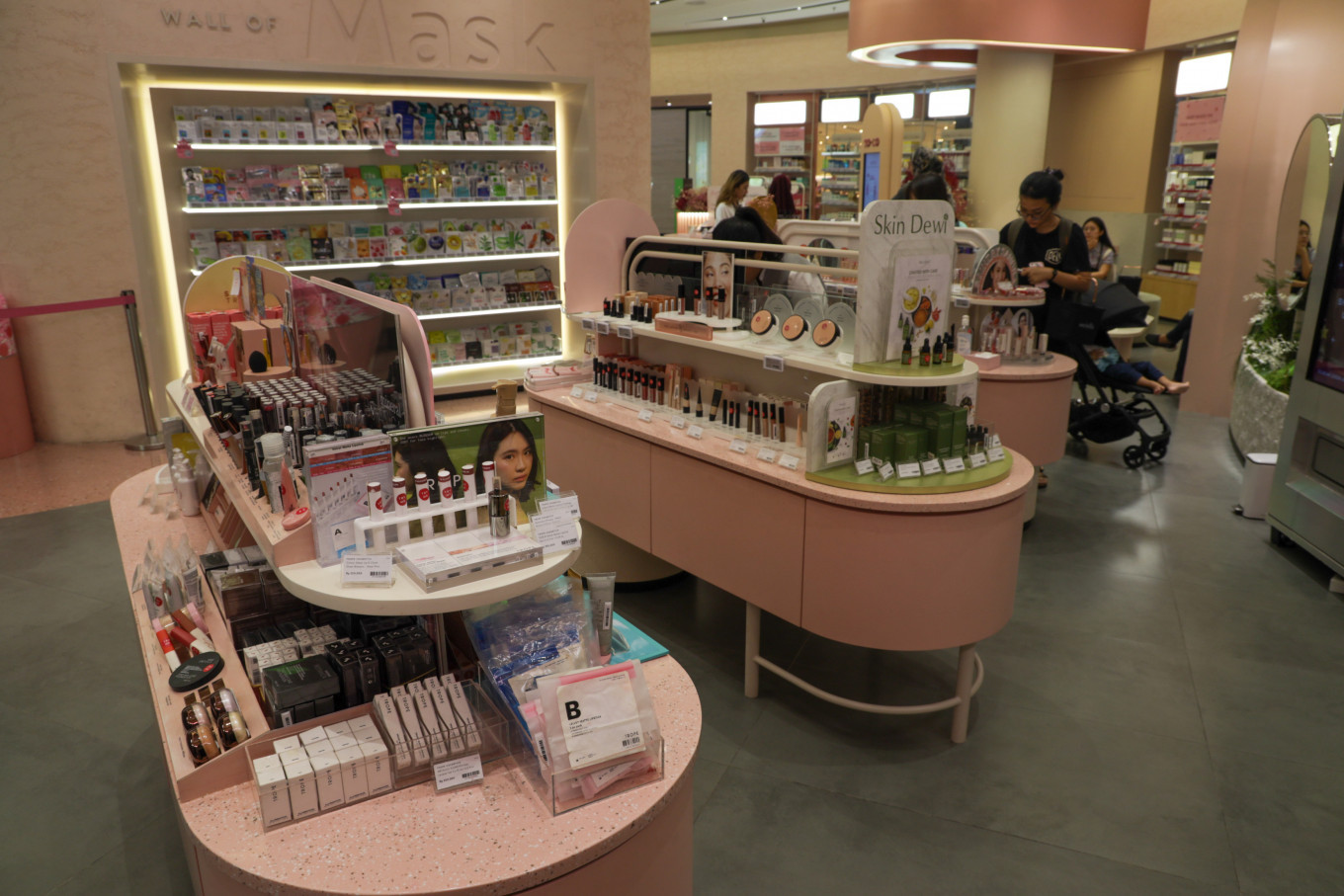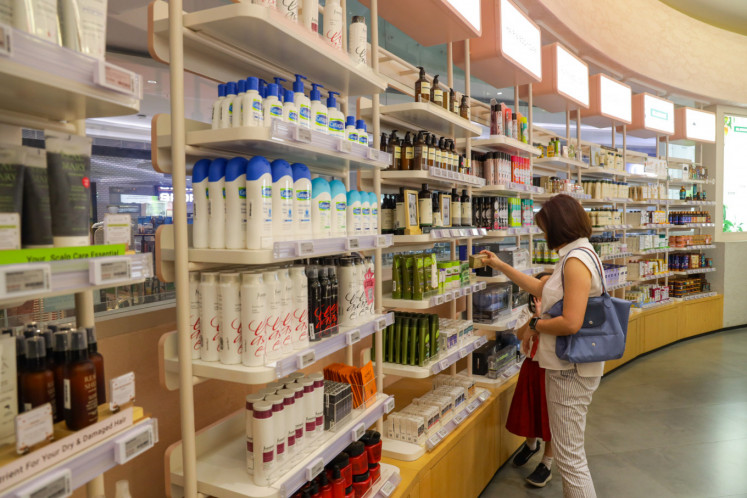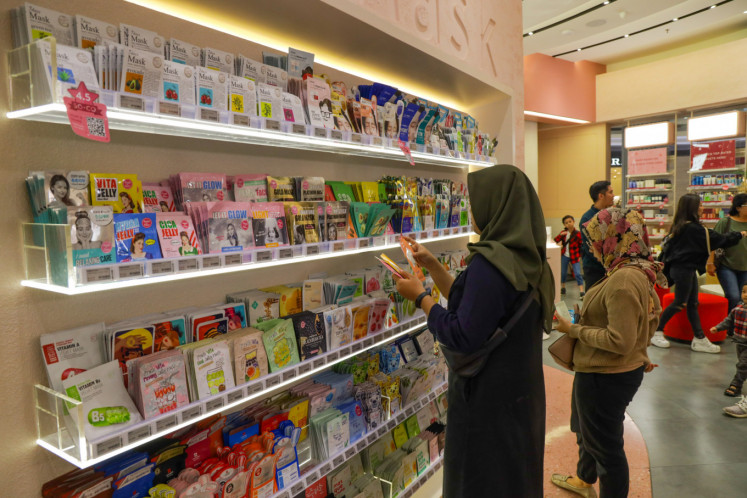Popular Reads
Top Results
Can't find what you're looking for?
View all search resultsPopular Reads
Top Results
Can't find what you're looking for?
View all search resultsIndonesian beauty trends to look out for in 2020
From vibrant eye makeups to single-ingredient skincare products, Indonesia's beauty industry in 2020 is predicted to be a battle ground for local and international brands.
Change text size
Gift Premium Articles
to Anyone
For Maria Fifi, makeup and skincare products from local brands have become a daily part in her life.
Since 2015, she has used a variety of products, including liquid soap from The Soap Corner, rose water and body balm from Biotalk and liquid eyeshadow from The Bath Box.
“I’m a supporter of local brands, especially for ones that highlight natural ingredients,” she told The Jakarta Post on Tuesday. “I’d like to support local small-medium enterprises [SMEs] and prove that local brands are able to offer high-quality products at affordable prices.
“I think local brands are developing rapidly, with more and more people becoming aware of them.”
People’s interest over skincare and makeup products has improved in the last five years, but they've received more exposure recently due to social media. (JP/Dionnasius Aditya)Chrisanti Indiana, cofounder and chief marketing officer of integrated beauty-technology company PT Social Bella Indonesia, said interest in skincare and makeup products has increased significantly in the last five years. The company runs popular beauty e-commerce site Sociolla.
“[Beauty trends] have received more exposure recently because of social media and people quickly became more interested,” Chrisanti said on Monday in West Jakarta.
Katadata.co.id reported that the Industry Ministry aimed to expand the domestic cosmetics industry by 9 percent in 2019 or 7.3 percentage points higher than in 2018.
In 2019, the country's beauty industry was influenced by past trends. New makeup products were said to be more inclusive of Indonesians’ diverse skin tones, with one example being the cushion compact.
Popularized by South Korean brands, a cushion compact consist of a sponge soaked in foundation or tinted moisturizer, according to byrdie.com.
Cushion compacts are not new to Indonesian customers, but only a few of them support a wide range of skin tones. This started to shift last year when a number of local brands released cushion compacts for darker skin tones, including Make Over and Purbasari.
In skincare, local brands began to highlight single active ingredients in their products – a trend introduced by The Ordinary from Canada-based company Deciem. Fashionista.com wrote that the practice provided simplicity to customers and they knew what ingredient they applied to their skin.
In Indonesia, the newly established Somethinc is among the brands that provide single ingredients in their products.
In 2020, the trend for makeup is predicted to shift from complexion to eyes. Elizabeth “Lizzie Parra” Christina, CEO of By Lizzie Parra (BLP) Beauty, said customers would find various eye makeup products that play with colors and glitter, such as in eyeliners and eye shadows.
“I think neon colors are also getting popular in other countries this year, making people more confident to wear them,” Lizzie told The Jakarta Post in a phone interview on Jan. 10.
Chrisanti from PT. Social Bella Indonesia said multifunctional makeup products, such as lipstick that can be used as a blush, and makeup products with skincare benefits will also be popular this year.
For skincare, beauty enthusiast Affi Assegaf said products that focus on one ingredient will still be in demand as consumers were getting more aware of active ingredients.
“Products that feature a single ingredient and are packed in simple packaging that make it easier for people to recognize the ingredient are still popular,” said Affi via phone interview on Jan. 17.
Ingredients like Aloe vera and Centella asiatica (cica) were among the most sought-after in Indonesia last year, thanks to the popularity of certain South Korean brands. Both are claimed to soothe and hydrate the skin.
Affi, who cofounded popular beauty website Female Daily Network, predicted that bakuchiol and probiotics are the next big players in 2020. Bakuchiol is perceived as a gentler alternative to retinol, said to revitalize the skin with minimum irritation. While probiotics in skincare helps fight bad bacteria to prevent inflammation and premature aging, according to Forbes.com. Lancome and First Lab are some of the current brands using probiotics in their products.
In 2019, beauty clinic ZAP conducted a ZAP Beauty Index survey for 6,460 female respondents aged between 13 and 65 from across Indonesia.
The survey found that 57.6 percent preferred skincare products from South Korea, followed by local products (37.4 percent) and Japanese products (22.7 percent).
Customers browse sheet masks on display at a Sociolla store in West Jakarta. (JP/Dionnasius Aditya)Affi said international brands may still dominate the industry as they were already established, while most newly launched brands in the country were still small-scaled.
“New Korean brands that didn’t use to be available will enter Indonesia,” she said. “The same goes for brands from Australia, the United States and Europe. The competition will be more interesting.”
According to Lizzie, local brands can still compete as they will progress.
“If we’re talking about indie brands founded one to three years ago, they will get more creative,” she said.
Meanwhile, Chrisanti said Sociolla customers recognized each brand’s values as they tended to choose products based on quality regardless of their origin.
“Local products have featured more advanced, innovative technology, something that international brands have also pursued. [These brands] will continue to be competition,” she said. (wng)













